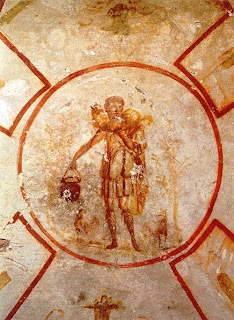 |
| Mosaic of Christ Ascended |
Psalm 68:1-10, 33-36
1 Peter 4:12-14, 5:6-11
John 17:1-11
In older calendars the period following Ascension Day was a distinct liturgical season. Nowadays, though the theme of Ascension is still prominent, this Sunday is demarcated as the last Sunday in the season of Easter. Appropriately the Lectionary chooses Bible readings that will link its beginning with its close. The passage from the first chapter of Acts recounts the final Resurrection appearance that Jesus made to his disciples – the occasion of his ascension to the Father. The Gospel passage – from John – is linked to this event by having a similar theme. Jesus expressly says “I am coming to you, Holy Father”. The difference, though, is that he says this before his trial, Crucifixion and Resurrection, which means he still has a long and arduous path to tread. Yet it is at this point that he declares “Now I am no longer in the world”. What can he mean? Even when he has risen from the dead he appears in Galilee. Doesn’t his departure from ‘this world’ have to wait for Ascension?
How are we truly to know God in Christ? Part of the answer lies in our own conduct. This week’s Epistle says “Discipline yourselves, keep alert”, and so we should. But that is only part of the answer. The real Good News is that thankfully we are not at the mercy of our own, often feeble, efforts. When the spirit is willing but the flesh is weak “cast all your anxiety on him, because he cares for you”. Jesus can save us because he loves us in precisely the way that God does. We hold out our hands, but he it is who reaches down to us; we open our hearts, but it is his saving spirit that enters them. That is the promise of Pentecost, the season just about to come.



